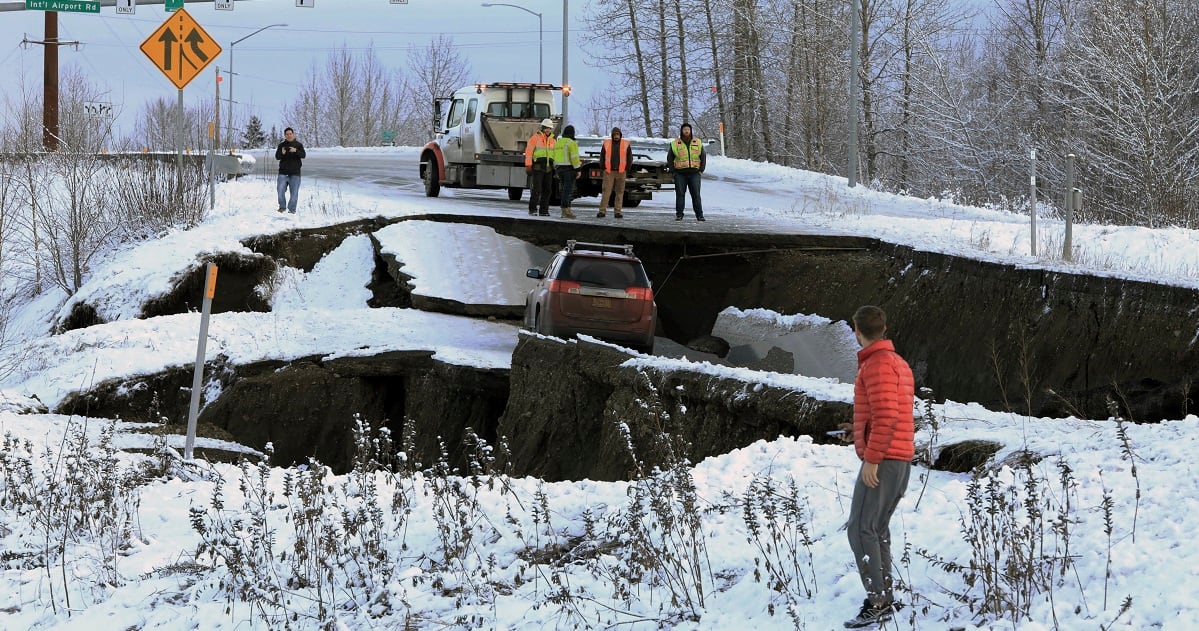RIDGECREST, Calif. — The two major earthquakes that hit Southern California should alert people across the nation of the need to be prepared for natural disasters, the state’s governor said as officials expressed relief that the damages weren’t worse.
Gov. Gavin Newsom said Saturday that governments must strengthen alert systems and building codes, and residents should make sure they know how to protect themselves during an earthquake.
"It is a wake-up call for the rest of the state and other parts of the nation, frankly," Newsom said at a news conference to update the public on the state's efforts to help the region hit by earthquakes on Thursday and Friday.
Friday's earthquake was the largest one in Southern California in nearly 20 years. Officials voiced concerns about the possibility of major aftershocks in the days and even months to come.
No fatalities or major injuries were reported after the 7.1-magnitude quake, which jolted an area from Sacramento to Mexico and prompted the evacuation of the Navy's largest single landholding, Naval Air Weapons Station China Lake in the Mojave Desert.
The quake struck at 8:19 p.m. Friday and was centered 11 miles (18 kilometers) from Ridgecrest, the same area of the desert where a 6.4-magnitude temblor hit on Thursday. It left behind cracked and burning buildings, broken roads, obstructed railroad tracks and leaking water and gas lines.
The light damage was largely due to the remoteness of the area where the earthquake occurred, but Newsom cautioned after touring Ridgecrest that "it's deceiving, earthquake damage. You don't notice it at first."
Newsom estimated more than $100 million in economic damage and said President Donald Trump called him to offer federal support in the rebuilding effort.
"He's committed in the long haul, the long run, to help support the rebuilding efforts," Newsom said of Trump.

Only 28,000 people live in the Ridgecrest area, which is sandwiched between more populated areas of Southern California and Las Vegas' Clark County. Seismologists warned that the area could see up to 30,000 aftershocks over the next six months, though many of those will be too small for people to notice.
April Hamlin said she was "already on edge" when the second quake rattled her Ridgecrest home. She and her three kids initially thought it was another aftershock.
"But it just kept on intensifying," Hamlin said. "The TV went over, hanging by the cord. We heard it break. We heard glass breakage in the other rooms, but all we could do was stay where we were until it stopped."
With the possibility of aftershocks and temperatures forecast to reach 100 degrees Fahrenheit (38 Celsius) over the next several days, officials were taking precautions.
The California National Guard was sending 200 troops, logistical support and aircraft, Maj. Gen. David Baldwin said. The Pentagon had been notified, and the entire California Military Department was put on alert, he said.
Naval Air Weapons Station China Lake said in a Facebook post that nonessential workers were evacuated and operations halted. The epicenters of both quakes were on the base, and officials said they are continuing to assess damage. Officials said most employees live off the base and in Ridgecrest, but they authorized the evacuation so those who live on base can be eligible for reimbursements.
RELATED

The California Office of Emergency Services brought in cots, water and meals and set up cooling centers in the region, Director Mark Ghilarducci said.
State highway officials shut down a 30-mile (48-kilometer) section of State Route 178 between Ridgecrest and the town of Trona southwest of Death Valley because of a rockslide and severe cracking. The move left Trona temporarily cut off. California Department of Transportation spokeswoman Christine Knadler said crews worked through the night to patch the roadway, but it remained rough and uneven.
Ron Mikulaco, 51, and his nephew, 23-year-old Brad Fernandez, stood on 178 on Saturday looking at the cracks. The pair drove from Huntington Beach, about 170 miles (274 kilometers) southwest of Ridgecrest. Mikulaco, an amateur geologist, wanted to show his nephew "the power of Mother Nature," and they had the epicenter's latitude and longitude coordinates ready.
"We put that in the GPS, and we'll get as close as we can," Fernandez said.
In Ridgecrest, local fire and police officials said they were initially swamped by calls for medical and ambulance service. But police Chief Jed McLaughlin said there was "nothing but minor injuries such as cuts and bruises, by the grace of God."
Two building fires — one involving a mobile home — were quickly doused, McLaughlin said, and natural gas lines where leaks were reported were shut off.
When asked to describe what he has been going through in the past two days, the chief said: "Grief, shock and then, for me, pride in what I've seen from here, my people. It's been a vast range of emotions, and I think the whole community's going through that."

In Trona, a town of about 2,000 people considered the gateway to Death Valley, fire officials said up to 50 structures were damaged. San Bernardino County Supervisor Robert Lovingood said FEMA delivered a tractor-trailer full of bottled water because of damage to water lines. Newsom declared a state of emergency for the county.
Julia Doss, who maintains the Trona Neighborhood Watch page on Facebook, said the only food store in town is a Family Dollar store that was shuttered Saturday.
"The only way to get food is to drive to Ridgecrest, and with only three gas stations in town I'm worried we may soon run out of fuel," Doss said.
Antoun Abdullatif, 59, owns liquor stores and other businesses in Ridgecrest and Trona.
"I would say 70% of my inventory is on the floor, broken," he said. "Every time you sweep and you put stuff in the dust bin, you're putting $200 in the trash."
But he has stopped cleaning up, believing another earthquake is on the way.
Lucy Jones, a seismologist at the California Institute of Technology and a former science adviser at the U.S. Geological Survey, said the new quake probably ruptured along about 25 miles (40 kilometers) of fault line and was part of a continuing sequence. The seismic activity is unlikely to affect fault lines outside of the area, Jones said, noting that the gigantic San Andreas Fault is far away.
Egill Hauksson, another Caltech seismologist, said later in the day that scientists believe the continuing sequence could produce more than 30,000 quakes of magnitude 1 or greater over six months. He said the probability of a magnitude 7 over the next week is about 3%, but one or two magnitude 6 quakes are expected.
Antczak reported from Los Angeles. Nguyen reported from San Francisco. Associated Press writers Julie Carr Smyth in Columbus, Ohio, Brady McCombs in Salt Lake City, Juliet Williams in San Francisco, Adam Beam in Sacramento, Stefanie Dazio and Robert Jablon in Los Angeles, Tarek Hamada in Phoenix, and freelancer Jolene Latimer in Los Angeles contributed to this report.





